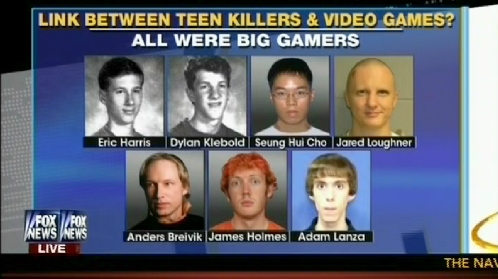Several media figures have reacted to the mass shooting in Washington, D.C.'s Navy Yard by downplaying the role access to firearms had in the killings, instead blaming video games and their purported effect on mental health. But studies have either debunked or failed to find a plausible link between playing violent video games and real world gun violence.
Much of the connection between shooter Aaron Alexis and video games appears to come from Mike Ritrovato, who says he knew Alexis. Ritrovato told The Los Angeles Times that “if [Alexis] had anything bad about him, it was that he was a 35-year-old man playing video games.” Ritrovato also told ABC News that Alexis was often late to work “because he was staying up all night playing video games.”
Based on these reports, several media figures have sought to draw a direct connection between the shooting and Alexis' interest in video games.
On the September 17 Fox & Friends, co-hosts Steve Doocy and Elisabeth Hasselbeck promoted the gaming connection:
ELISABETH HASSELBECK: And are more people susceptible? You know are more people, maybe more susceptible than others to playing video games. Is there a link between a certain age group or demo in this - twenty to thirty-four year old men, perhaps, that are playing these video games and then their violent actions? We have yet to find out.
STEVE DOOCY: Well just, I mean, unfortunately you know it seems every time something bad like this happens we look at “is there a connection between video games and the shooter?” Well, take a look at some people who were described as addicted, from Columbine High School, Eric Harris and Dylan Klebold, the Virginia Tech shooter, the Arizona shooter, Jared Lee Loughner, that Norway shooter who Anders Behring [sic], I think he shot 77 people. The Aurora shooter, James Holmes, the Sandy Hook shooter, Adam Lanza, they're all described as essentially being addicted to video games.
Hasselbeck went on to suggest monitoring how frequently gamers play violent games and suggested that “maybe they time out” after a certain amount of time played.
Fox and Friends also re-used a graphic with pictures of seven mass shooters that noted that “all were big gamers.”
At the top of the conservative Drudge Report, an image from the military-themed game Call of Duty: Black Ops 2 was used along with the headline “Navy Yard Shooter 'Obsessed With Violent Video Games',” which linked to a Telegraph story detailing Alexis' history with video games. TheTelegraph piece labeled Alexis' gaming habit part of the “darker” side of his character.
MSNBC's Mika Brzezinski claimed on Morning Joe that “it's kind of hard not to make a connection when you hear his friend saying that he would watch on a life size screen these violent video games for hours and hours and hours and hours and hours.” Her co-host, Joe Scarborough, noted that the shooter had this trait “in common with the Newtown shooter and so many others.”
On The 700 Club, televangelist Pat Robertson -- who has previously claimed that murders committed in video games are as sinful as “performing the act” in the real world -- worried about the “life altering” effects of violent video games:
While media figures are predictably pinning blame on video games for yet another mass shooting, academic studies tell a different story. A 2013 study in in the Journal of Aggression, Maltreatment &Trauma studied environmental influences on violence and concluded that “Media use was not associated with either increased or decreased risk of adult criminality.”
Previous research into this topic has produced similar results. First Amendment watchdog group Media Coalition summarized past studies on violent video games, writing, “Reviews by the governments of Australia, Great Britain and Sweden have all studied the research claiming a link between violent video games and aggressive behavior and concluded that it is flawed, flimsy and inconclusive.”
Media Coalition also noted that in the course of striking down a California law seeking to restrict the sale of violent video games, “the U.S. Supreme Court in 2011 noted that the scientific evidence the state relied upon had been rejected by nearly every court to consider it, and that 'most of the studies suffer from significant, admitted flaws in methodology.'”
The Washington Post's Max Fisher analyzed the data on video game sales and gun-related killings internationally, writing that, “Looking at the world's 10 largest video game markets yields no evident, statistical correlation between video game consumption and gun-related killings.”
In fact, Fisher found that “this data actually suggests a slight downward shift in violence as video game consumption increases” and concluded, “video game consumption, based on international data, does not seem to correlate at all with an increase in gun violence.”
So, what have we learned? That video game consumption, based on international data, does not seem to correlate at all with an increase in gun violence. That countries where video games are popular also tend to be some of the world's safest (probably because these countries are stable and developed, not because they have video games). And we also have learned, once again, that America's rate of firearm-related homicides is extremely high for the developed world.

